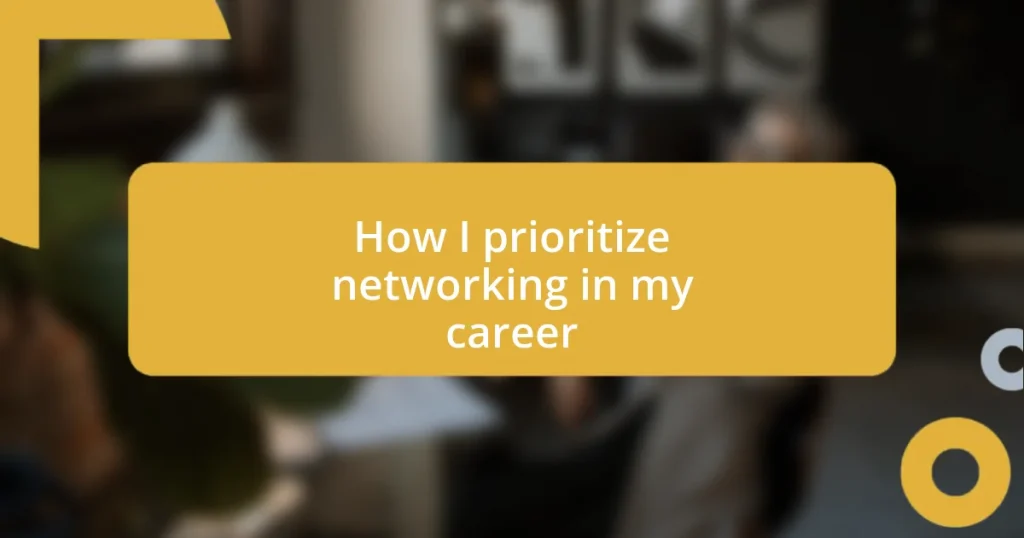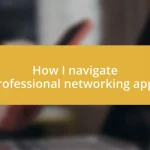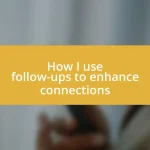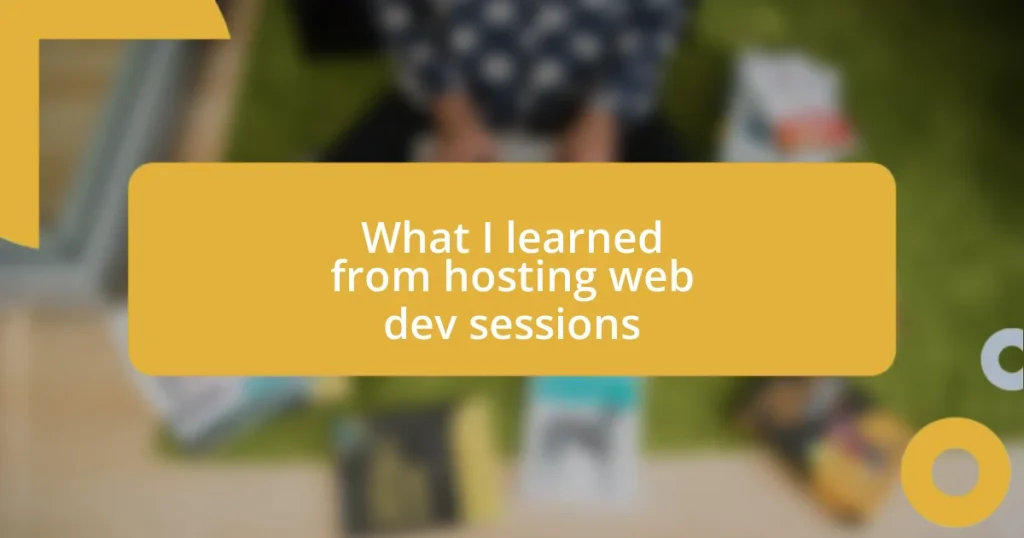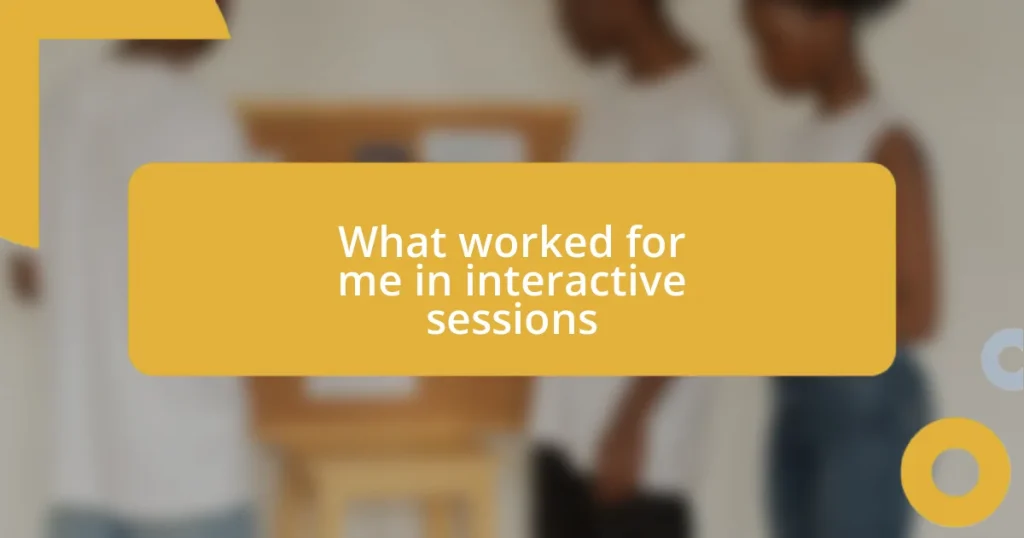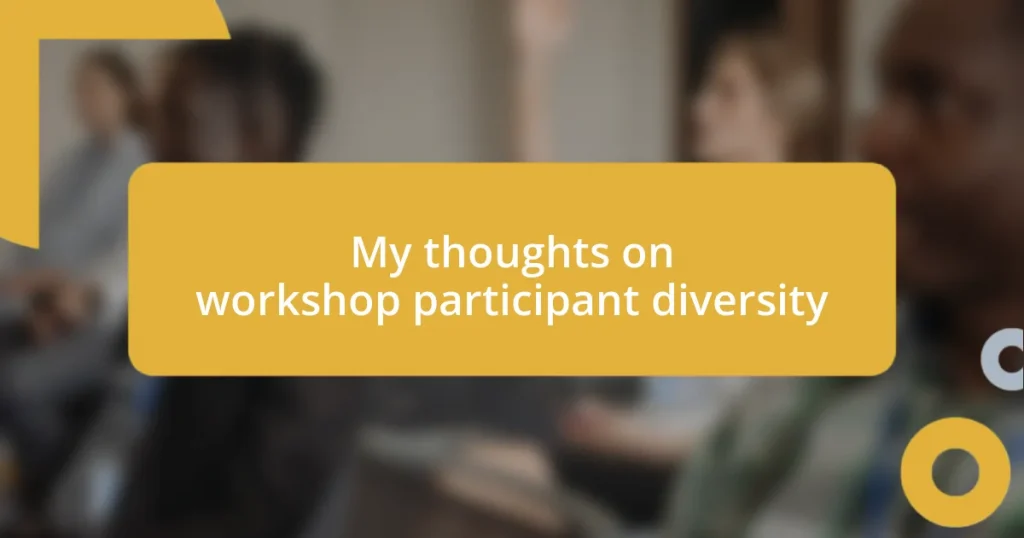Key takeaways:
- Networking is about building genuine relationships, not just exchanging business cards; emotional connections can lead to mentorship and career opportunities.
- Identifying key networking opportunities through events, social media, and alumni groups can significantly enhance professional growth and collaboration.
- Nurturing existing relationships with gratitude and recognition, alongside tracking the impact of networking, can lead to fruitful long-term connections and career advancements.
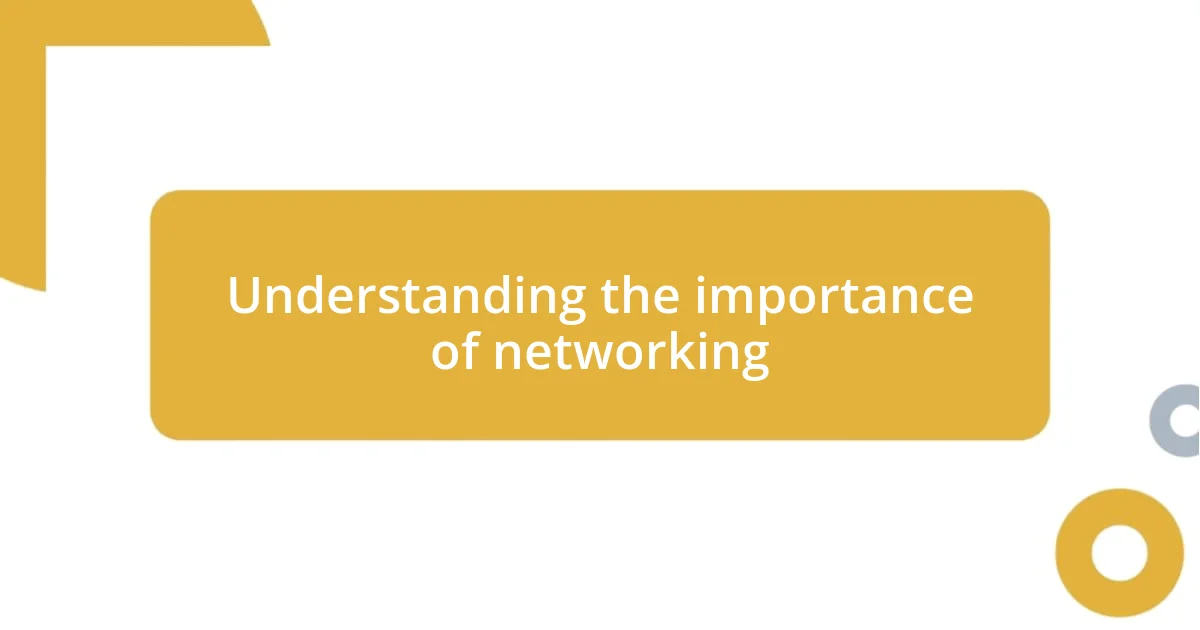
Understanding the importance of networking
Networking serves as a bridge between ambition and opportunity. I still remember my first industry conference; I felt like a fish out of water. But when I struck up conversations, I realized that each genuine connection could lead to a potential collaboration or job opportunity. Isn’t it fascinating how one conversation can redirect the course of our careers?
When I think about networking, it’s not just about collecting business cards; it’s about building relationships grounded in trust. I’ve had experiences where a simple coffee chat turned into a long-term mentorship. This kind of connection has been invaluable, providing me with guidance and insights that no textbook could offer. How often do we overlook the deeper potential behind a shared cup of coffee?
Moreover, the emotional aspect of networking is often underrated. I feel a sense of belonging when I interact with my peers, and it reinforces the idea that we’re all navigating similar challenges. It’s empowering to surround myself with like-minded individuals who inspire me to push my boundaries. Have you ever felt that surge of motivation from just being in the right company? That’s the magic of networking.
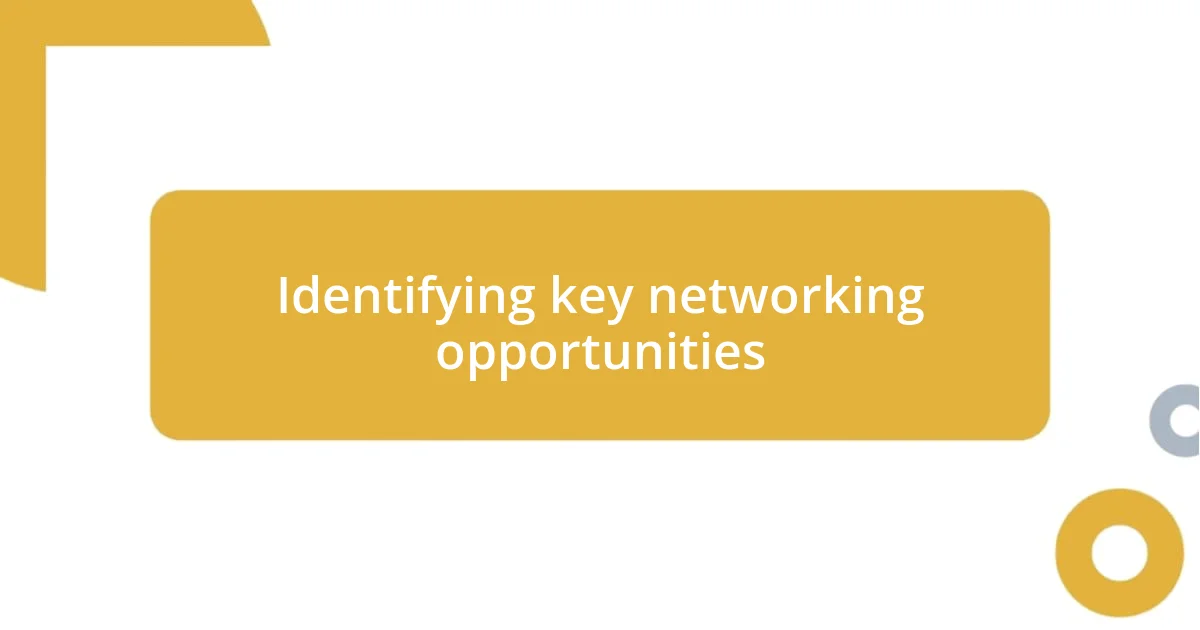
Identifying key networking opportunities
Identifying key networking opportunities is crucial for career growth. I recall attending a local workshop that focused on skill-building for my industry. While the sessions were valuable, it was the casual breaks between talks that offered the most potential for connection. Those moments allowed me to engage in meaningful discussions with fellow attendees and panelists, opening doors for future collaborations I hadn’t even anticipated.
To pinpoint effective networking opportunities, consider these strategies:
- Industry Events: Conferences and workshops can be goldmines for meeting people who share your interests.
- Professional Associations: Joining professional groups related to your field expands your network and provides learning platforms.
- Social Media Platforms: Sites like LinkedIn are excellent for connecting with industry leaders and peers, allowing for insightful exchanges.
- Informational Interviews: Reaching out for casual chats can help you gain insights while also establishing rapport with seasoned professionals.
- Alumni Networks: Engage with your college or university alumni associations to reconnect with former classmates and their connections.
Each of these opportunities can unveil new pathways and insights, enlightening your career journey in ways you may not yet envision.
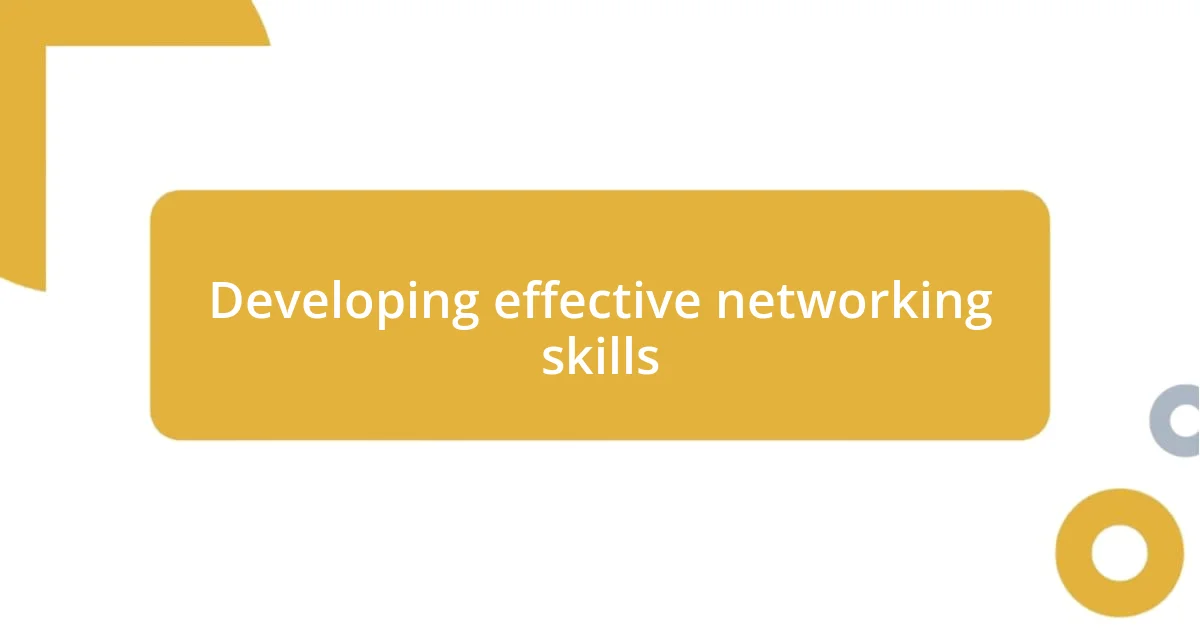
Developing effective networking skills
Developing effective networking skills is more than just a checklist; it’s about mastering the art of sincere communication. I remember sitting at a roundtable discussion where I was nervous to share my thoughts. But when I opened up about my challenges, others began to do the same. That vulnerability sparked deeper conversations, transforming a group of strangers into a supportive community. How often do we underestimate the power of being genuine in our interactions?
Effective listening is another crucial skill in networking. I’ve found that when I focus on others, asking questions about their experiences, it opens the door for richer dialogue and connection. For instance, during a volunteer event, I engaged with someone who shared their journey through a challenging project. By truly listening, I not only learned valuable insights but also forged a bond that led to a collaboration later on. Have you ever realized that some of the best networking moments happen when we prioritize listening over speaking?
Lastly, follow-up plays a vital role in maintaining new connections. After a recent seminar, I took a few minutes to send personalized thank-you notes to the speakers I admired. This small gesture rekindled discussions months later, leading to mentorship opportunities I had not anticipated. Engaging with your network shouldn’t stop after the first conversation; it’s about nurturing those relationships long-term. What strategies do you use to follow up after an event?
| Networking Skill | Description |
|---|---|
| Sincere Communication | Building genuine relationships by being open and authentic. |
| Effective Listening | Focusing on others’ stories creates deeper connections and valuable insights. |
| Thoughtful Follow-Up | Nurturing relationships through personalized messages and continued engagement. |

Creating a strategic networking plan
Creating a strategic networking plan is like drawing a roadmap for your career journey. I once sat down to map out my networking goals, and it was eye-opening. I identified specific areas where I wanted to connect more deeply, like leadership and innovation, which guided my attendance at certain events and online discussions. Have you ever thought about what you really want to gain from your networking efforts?
Next, I make it a point to set both short-term and long-term networking goals. For example, during one quarter, I aimed to connect with three new professionals in my field and follow up with them regularly. It helped me stay focused and accountable. I can’t emphasize enough how effective it is to track these connections; it turns networking from a casual activity into a structured part of your professional growth.
Lastly, I prioritize regular check-ins with my network. I once sent a simple “thinking of you” email to an old contact, and it led to a coffee chat that reignited our collaboration on a project we had shelved. These small gestures matter; they keep you in the minds of your connections and reveal opportunities you might have missed otherwise. What little steps can you incorporate into your networking plan that could yield big payoffs down the line?

Leveraging social media for networking
Leveraging social media for networking has been a game changer for me. I remember the first time I reached out to someone I admired on LinkedIn. I was hesitant, but I sent a message expressing my appreciation for their work. To my surprise, they replied, and we ended up having a meaningful conversation that not only boosted my confidence but also opened doors to new opportunities. It made me realize how powerful an online platform can be when used correctly. Have you ever experienced instant connections through a simple message?
In my experience, engaging actively with industry-related content on platforms like Twitter or Instagram can also enhance my visibility. I often share articles or comment on posts, which sparks conversations with like-minded professionals. Once, after sharing my thoughts on a trending topic in my field, someone reached out for a collaborative project. It showed me that social media is not just a broadcasting tool; it can be a bridge to real, impactful connections. How do you use social media to showcase your expertise?
Additionally, I find that joining relevant groups or communities online is essential for fostering networking relationships. For instance, I joined a Facebook group focused on my industry, and actively participating in discussions led to invitations to virtual workshops and webinars. There, I met individuals who shared insights that were so valuable, I still apply them today. It’s amazing how a supportive digital community can enhance our professional journey. What online spaces have you discovered that contribute to your networking success?

Nurturing professional relationships over time
Nurturing professional relationships requires ongoing effort and genuine engagement. I remember a time when I made a concerted effort to check in with a mentor who had profoundly influenced my career. A quick message saying, “I appreciate your guidance,” not only rekindled our connection but also led to invaluable advice that shaped my next career move. Have you ever reached out to someone just to let them know they made a difference in your journey?
I also find that celebrating milestones and achievements of my connections helps in maintaining strong ties. When a former colleague landed a significant promotion, I took the time to send a heartfelt congratulatory note. This small gesture sparked a delightful conversation and led to a renewed partnership on an upcoming project. It’s these moments of recognition that show you care; they transform your professional relationships from transactional to meaningful. How do you celebrate the wins of those in your network?
Finally, I believe in the power of gratitude. I try to express my appreciation regularly, whether it’s through a simple “thank you” after a meeting or a follow-up message sharing how someone’s input helped me. One time, I wrote a handwritten note to a former boss who had taken the time to guide me through a complex problem. The warmth of that personal touch was reciprocated with an unexpected invitation to collaborate on a new initiative. Isn’t it interesting how investing time in gratitude can yield such rich professional rewards?

Measuring networking success and impacts
Measuring the success and impact of networking isn’t always straightforward, but I’ve found that reflecting on the outcomes of my connections gives me valuable insights. For instance, after attending a local networking event, I like to track how many meaningful conversations I had and any opportunities that sprung from them, whether it’s a new project or a mentorship. Have you ever considered the ripple effect a single conversation can create in your career?
Another aspect I focus on is the longevity of the relationships I build. I once reconnected with a former coworker after several years, and our conversation revealed not just nostalgia but also potential collaboration on a new venture. That made me realize how valuable it is to nurture these connections over time. How often do you revisit old relationships to see what new opportunities they might present?
I also pay attention to qualitative feedback from my network; it tells me how my interactions resonate with others. Last year, I reached out to someone I had helped in the past, and to my delight, they expressed how much my support had impacted their journey. It struck me that these personal testimonials highlight the true value of networking—it’s about building a community that uplifts and inspires one another. Have you ever received unexpected feedback that shifted your perspective on your networking efforts?










